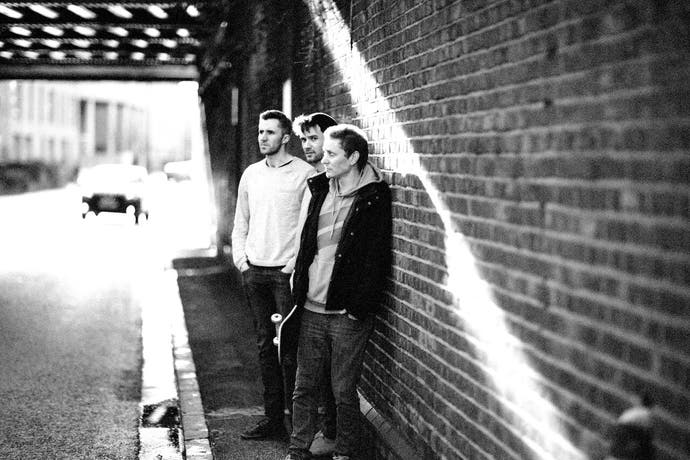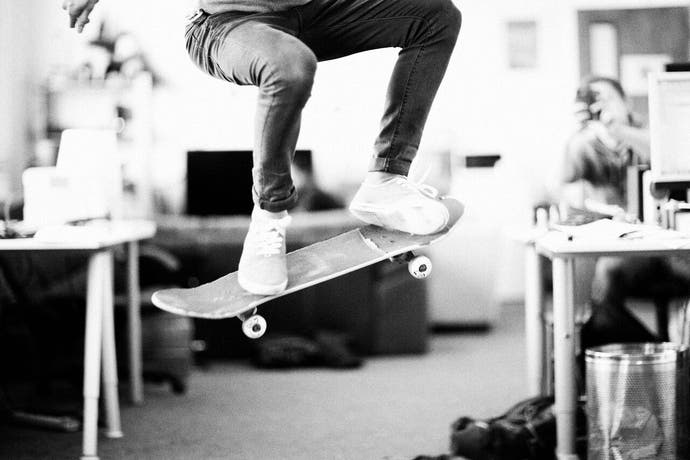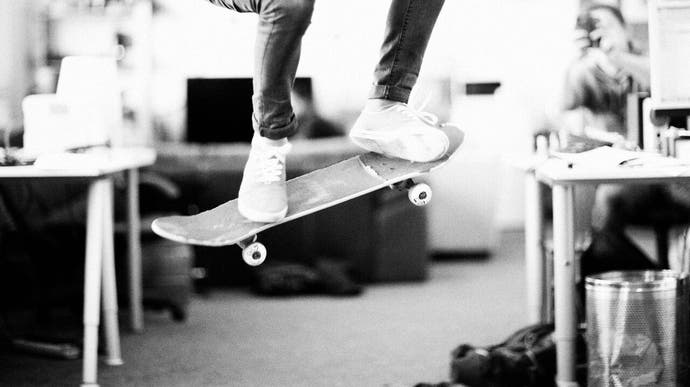The past, present and future of OlliOlli
Skate expectations.
Isn't it just terrifying how much can change in just over five years? Back in the summer of 2013, I made the short trip on the DLR from Lewisham to Deptford to follow up on an email that had been blindly submitted to Eurogamer's generic inbox: a Vita game being made in the very heart of south east London? This I had to see.
It was everything you'd hope a Deptford game developer would be; a stone's throw from Christopher Marlowe's gravestone and some of the dirtier banks of the Thames, the office was up a chilly, yellowing staircase, through a dark hallway and into a top floor that was positively filthy. Working amongst the clutter was the small team known as roll7 who, I'm sure they won't mind me saying, didn't seem entirely sure of what they were doing. With a background in music and community projects, chance had led them to embark on their very first console game.
And what a game it was. I was dazzled by OlliOlli, the stylish, wonderfully playable 2D skating game, back then, and I'm still bowled over by it now. There's a spark there that's been evident in every roll7 game since, leading me to seek out their games in much the same way I used to seek out every Treasure release through the 90s. OlliOlli remains one of the very best, though, going on to bag a BAFTA and no small amount of success. And now, alongside its sequel, it's making a belated outing on Nintendo's Switch.
Which is what brings me back on a cold February afternoon to a Deptford that's almost unrecognisable, all craft beer shops and pop-up galleries, to meet in the obnoxiously named Coffee Stories. "It's quite amazing being back here in 2019," says Simon Bennett, one of roll7's founders who in the intervening years had moved to Cornwall before south London pulled him back in again. "While we were here, it was proper grimy, the office was super grimy, and there wasn't anywhere to go for a coffee or a drink. Now it's like being in the middle of Shoreditch."
A lot has changed - roll7 now work remotely, and the office is no more - but so much has stayed the same. Bennett and fellow founder John Ribbins are still like two excitable kids, wide-eyed at the good fortune that's come their way, two skaters - the four-year-old Simon used to roll down nearby Greenwich Park while sitting down before he got the courage to stand, while John skated around his hometown of Plymouth on a green plastic pennyboard before graduating to more serious kit - delighted to have turned their hobby into a game. They did it justice too; OlliOlli sits up there with the likes of Tony Hawks as one of the better takes on the pursuit.

"I loved Tony Hawk - the first one was amazing," says John. "We'd have to play it realistically - you couldn't do crazy manuals and combos, you had to play it like you were actually skating. But then Tony Hawk went downhill - every year it got a bit more Bam Margera, a bit more racing shopping carts. Thrasher Skate and Destroy on PS1 is still my favourite, though - you have to press X to land your tricks, you start off and you can only ollie and then you learn new tricks, and it was all based on real skate spots. It was a skater's skate game. I finished that 100 per cent, and it was as hard as balls. Actually, balls are quite soft - it was as hard as nails. And then everything was terrible, until Skate."
"We used to play one run one pass and it was about who could get the biggest score," says Simon, before I suggest it sounds like another game of one and pass I used to play back then. "Yeah, there was a lot of smoking! I was with my friend, we were in a band and we'd play for hours and hours and hours, just blazing. There was just something about the tension, the risk/reward with every trick, you knew it was going to get harder, your balance was going to be super sketchy. It's all on you."
That affinity with the greats, and with skating itself, probably explains why OlliOlli gets so much right. It started as a simple demo originally destined for mobile, conjured up while the team was on a marketing job for the National Fraud Agency - hardly the most glamorous of jobs. Simon had headed off for a nine month sabbatical, but from afar saw that something special was taking shape. "I was away travelling, and John was sending these builds over Testflight," he says. "And I thought it was immense, like Canabalt mixed with skating, and my partner, she doesn't play games, and she wasn't leaving the hotel room at night - she was addicted to this game. So we sent high scores between each other, and there was this big email chain between us. And I thought there's something here."
Roll7 had some experience with games - they were working on ADHD training tools using brain/computer interfaces - but this was a whole different prospect. "It was still a million dollars to get a licence for Unreal. We were doing these games, and I thought we could be the first on this platform, we could be the leaders in these EEG games - and that took off so big, you know? At the time, I remember talking to John who was playing with these various prototypes. Steam was pretty nascent, Hotline Miami had just come out, and John was like 'let's make real games'. And that was so far from what we'd done, I remember thinking it was an absolute fantasy. What the hell are you talking about? Console? It was pie in the sky stuff."
A meeting with Shahid Ahmad, then the champion of all things indie at Sony, put the pieces in place, and OlliOlli found its home on the PlayStation Vita. Tying the game to an underperforming but much-loved piece of hardware no doubt helped its visibility - with a relative lack of competition and lots of people willing to march for games that pledged exclusivity, it's doubtful OlliOlli would have had such a high profile elsewhere. Still, the OlliOlli that finally made its way to release was very different to the one that was first conceived; initially, it was an infinite runner.
"It was randomly generated," says John. "I don't mean procedural, I mean random, and they were unfair at times. We had a programmer join, and he was trying to recreate that stuff and hacking it, and we couldn't do procedural generation the way we wanted to. So I built a level editor in Multimedia Fusion that could export a text file you could then open a level on the Vita with - and it was a premade level just to test things so we can test the mechanics."
"It was only two or three weeks later that we took that build to E3," says Simon. "We thought yeah, great, let's go to America! There was no background - the blue sky was the blue the Vita renders when there's nothing to render."
"There were only three levels you could play," John adds on the critical moment when the focus shifted. "They went to E3 with that build and doing a high score battle on a level we built where everything was combo-able, and Simon and Tom just passed it back between themselves on the plane for 12 hours trying to beat each other, and we thought we can't lose that. And I was like, cool - that saves us a massive headache, we don't have to do procedural generation anymore."
So funny to think that one of OlliOlli's strengths - its tracks which flowed together with the same sweet rhythm as its impeccable soundtrack, all pieced together with your skater's elastic moveset - only came about by chance, though that always seems to be the way with the best things. And it's not as it there was ever a grand design in place.

"It came together in about nine months," says Simon. "Which for us was an eternity!"
"That was nine times longer than we'd spent on any game before..." adds John.
"And the budget was sub-£100,000, or in that ballpark," says Simon. "And for us it was the biggest project we'd done in games. Now, that doesn't even get you two coders. What were we thinking? I had a full-on mental breakdown during that."
"And that's not hyperbole either," solemnly adds John.
The experience sounds nothing short of traumatic, the team having to learn on the fly and suffering for it. Things have improved since then - thankfully - though the outsider mentality that, I think, gives roll7's games an edge remains. They still don't really know the rules, so certainly aren't afraid of breaking them.
"Oh, we still have that mentality," says Simon. "Even though we've made four games in five years. I've still got that impostor syndrome, and I still have that. I'd look every day at the TRCs - the technical requirement checklist that PlayStation have, this encylopeadia of shit that can go wrong with your game and reasons they can not put it on the platform - and I'd look at this list and think, I don't know what any of these things are. How are we going to manage all this? It just broke my mind. And even when we finished it, we thought we'd made this terrible game. I thought we'd have to look for other jobs."
OlliOlli went on to do okay, of course. There was that BAFTA in 2015, a sequel and, most recently, roll7's most ambitious game yet in Laser League - a title that didn't get the numbers it deserved, but certainly showed the team could work wonders with a more lavish palette. How much has changed in their approach?
"Now, we're thinking about a new game we argue a lot, lot less," says Simon. "It's become this process of understanding how to make games. But OlliOlli was one massive argument. It was a baptism of fire - all of us were designers, all of us were lead artists. We didn't have a design document!"
"There's the ongoing joke about with Not a Hero we invented game design," says John. "We were like, what if you had levels and they got harder! It's taken us four projects and five years to invent, in the same way, game production. OlliOlli was built very small between the three founders. Laser League was Ultra Neon Tactics that we'd play on trips. And it's the same with what we're prototyping at the moment. We have to be really excited about doing it - that bit hasn't changed. Earlier, it'd be like - we love it, now what? Now it's a bit more considered. It saves a lot of arguments along the way."
Now that OlliOlli Switch Stance gives players the chance to return to both games, is there anything about the originals that makes the team wince?
"It's too hard," says John. "I don't find myself half the mechanics we do in our game. I play it at a much lower level than it can be played at. When you play a game that's not your own, you approach it very differently - you're like, you've given me all this shit to do, and if I can't do it I'm bad at the game. So it's been awesome that millions of people have played it, the biggest bit of feedback is that it's quite hard. The goal is to get more people to play it and not feel shit at it. If we did another one, it'd end up where OlliOlli 2 ends, but the journey there would be longer and more people would be prepared for that journey in the end."
And that sounds very much like they've got unfinished business with the game that made their name.
"Yeah - watch this space," says Simon. "We had an amazing time with Laser League, and were super happy with what we did there. But the skating hasn't gone away, we're still invested in that area. We needed a break, but we're ready to look at it again. You've got to be excited about these things, because it's such a commitment."
"When we finished OlliOlli 2 we were like, no more skating games ever," says John. "But then things percolate over time..."


